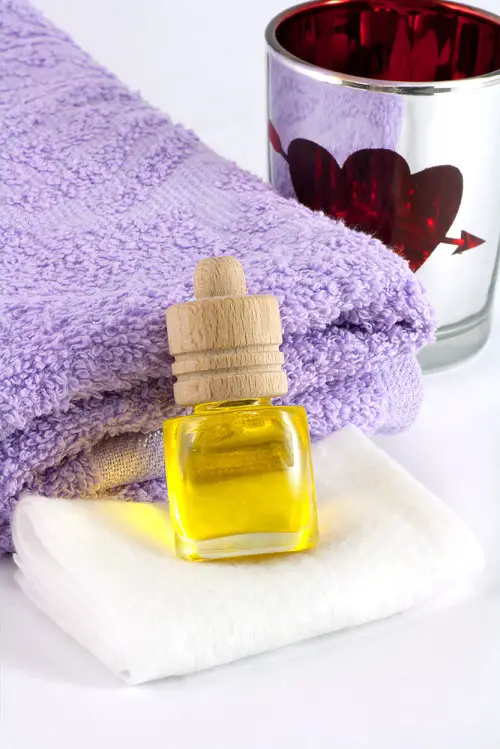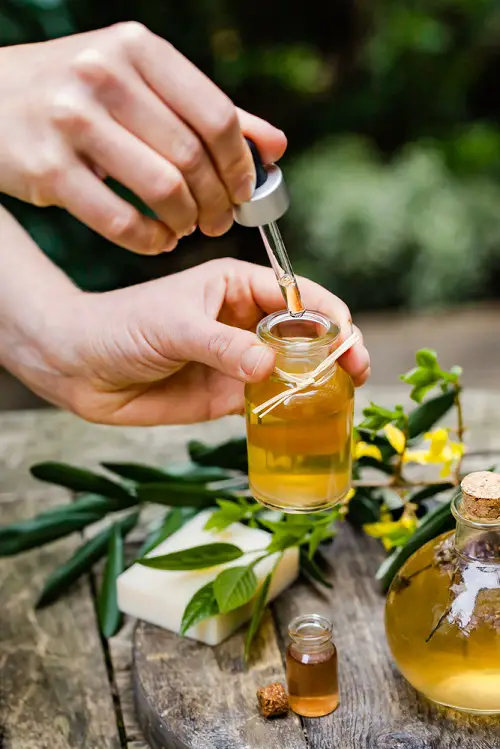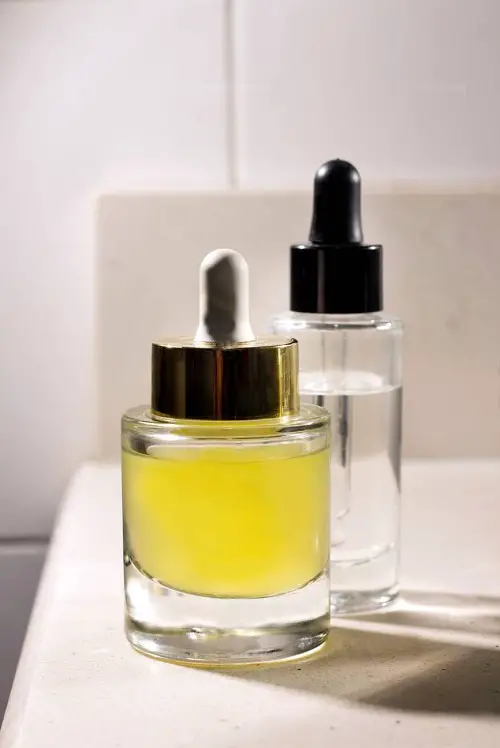Want to deal your dilemmas while choosing the most apt oil bottle? Get all your answers in this guide on fragrance oil vs. essential oil!
In a world full of exceptional products, it’s no wonder we find ourselves in a situation between a rock and a hard place. But, yes, never forget that we always come up with a cure that you can rely on. So, let’s get started.
What Is Fragrance Oil?

Fragrance oils are concentrated, man-made liquids that provide a vast array of scents. In fact, your favourite candle with that sweet bakery scent or your laundry detergent with that fresh linen aroma has a subtle tinge of fragrance oils. They typically combine synthetic aroma compounds, sometimes with a touch of natural essential oil, all diluted in a carrier like vegetable oil. This allows for a wider variety of scents at a lower cost.
What Is Essential Oil?

Extracting the essence of a plant is the magic behind essential oils. Through processes like steam distillation or cold pressing, these concentrated liquids capture the natural scent and flavour of the plant material. Each essential oil comes with a unique chemical profile, a complex blend of compounds responsible for its characteristic aroma and potential therapeutic properties.
This natural composition sets them apart from fragrance oils, allowing them to offer a more nuanced olfactory experience and, for some, potential wellness benefits.
Fragrance Oil Vs Essential Oil

1.Manufacture
- Fragrance Oil
Fragrance oils are born in the lab. Perfumers meticulously combine synthetic aroma chemicals, sometimes adding a tinge of natural essential oils, to create specific scents. These fragrant concoctions are then diluted in a carrier oil, like vegetable oil, to create a safe and usable product.
- Essential Oil
Essential oils prefer taking a more natural route. They’re extracted directly from plant material like flowers, leaves, or rinds. Steam distillation is a common method, where steam is passed through the plant matter, carrying the essential oil along with it. The steam and oil vapor are then condensed, separating the oil for collection. Another method, cold pressing, is used for citrus fruits where the rinds are pressed to release the essential oil.
2. Benefits
- Fragrance Oil
Fragrance oils shine forever in the scent creation process. Their wide variety and affordability make them perfect for crafting a pleasant atmosphere. It fits perfectly with all the standards. If you’re looking for a calming lavender aroma in your living room and a fresh citrus burst in your laundry detergent, fragrance oils can successfully serve the purpose. They’re also commonly used in scented candles, diffusers, and personal care products.
- Essential Oil
Essential oils’ natural composition allows them to be perfectly used for aromatherapy, a practice that uses essential oil scents to influence mood and well-being. Some essential oils, like lavender, can promote relaxation, while others, like peppermint, can improve focus. To add to that, some essential oils possess natural cleaning properties, making them a popular choice for DIY cleaning solutions.
3. Uses
- Fragrance Oil
Fragrance oils are all about creating a pleasant and customized scent experience. They’re commonly used in diffusers and candles to fill a room with a desired aroma. You’ll also find them in various household products like laundry detergent, dryer sheets, and air fresheners.
- Essential Oil
Essential oils, which are plant extracts squeezed from flowers, leaves, and even bark, are said to have medicinal benefits too. They also act like natural mood boosters or pregnancy helpers. A whiff of lavender oil eases headaches. But it’s always wise to check with your doctor before using them. Essential oils can also be a safe and natural way to scent your living space. From aromatherapy candles to calming room sprays and perfumes, these little bottles aid you in many ways.
4. Method Of Using Oils
- Fragrance Oil
Fragrance oils are generally much less concentrated than essential oils. This means you’ll need to use more fragrance oil to achieve a similar scent strength. For diffusers, a typical dilution for fragrance oil might be 10-20 drops per 100 ml of water.
- Essential Oil
A common dilution for diffusing essential oils is just 3-5 drops per 100 ml of water. It’s important to always follow the manufacturer’s instructions for dilution ratios, especially with essential oils. Since they’re concentrated, using too much essential oil can cause skin irritation or respiratory problems.
5. Cost
- Fragrance Oil
When it comes to cost, fragrance oils are the clear budget oils. Since they’re synthetically produced in labs, fragrance oils can be manufactured in large quantities at a lower cost. This translates to significant savings for you, the consumer.
- Essential Oil
Essential oils tend to be much more expensive. Their natural origin plays a big role, extracting essential oils often requires significant amounts of plant material and specialised techniques. For example, it can take hundreds of pounds of lavender flowers to produce just a single ounce of essential oil. This intensive process, coupled with the limited availability of some botanicals, drives up the price of essential oils.
6. Shelf Life
- Fragrance Oil
Fragrance oils generally have a longer shelf life compared to essential oils. Stored properly in a cool, dark place in a sealed container, fragrance oils can last a respectable 2–3 years. This is because they’re synthetic creations, less susceptible to the natural breakdown that occurs in essential oils.
- Essential Oil
Essential oils, on the other hand, are a bit more like fresh produce. Their natural composition means they’ll eventually degrade over time. Shelf life can vary depending on the specific oil, but with proper storage in dark, cool glass containers, you can expect them to last anywhere from 1-3 years. To ensure you’re getting the most out of your essential oils, always check the manufacturer’s recommendations for optimal storage and usage.
7. The Most Sought After Oil
- Fragrance Oil
When it comes to sheer popularity, fragrance oils take the crown. Several factors contribute to their global dominance. First, fragrance oils offer a mind-boggling variety of scents, from replicating the calming aroma of lavender to creating entirely new fantastical fragrances. This vast palette allows manufacturers to cater to a wide range of preferences. Second, fragrance oils are generally much more affordable than essential oils, making them accessible to a broader audience. This oil is easier and safer to use. Since they’re diluted and often pre-mixed, there’s less risk of irritation compared to some essential oils.
- Essential Oil
Essential oils offer potential therapeutic benefits, their higher price tag, specific uses, and sometimes stronger properties make them a more niche choice for many consumers.
Downsides Of Using Fragrance Oil
Fragrance oil is a pretty face until you are not exposed to its health-risk aspects. Following are some important reminders to keep in mind:
- Fragrance oils are party poopers for your skin, eyes, nose, and throat, causing irritation and reactions like allergies.
- Fragrance formulas are high on the list of potential asthma triggers, so if you find yourself wheezing more often around certain smells, it might be time to refrain from using such oils.
- Those chemicals that make fragrances last longer are called phthalates, which can mess with your hormones and even cause problems for the male reproductive system.
- The word “fragrance” on a label can hide a multitude of sins. It may consist of several harsh chemicals, and it’s quite tough to know exactly what chemicals you’re breathing in.

